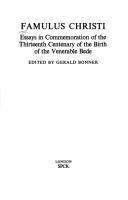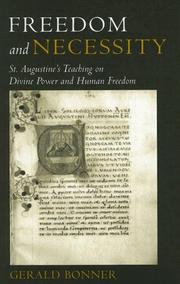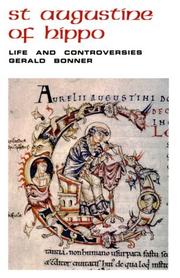| Listing 1 - 10 of 21 | << page >> |
Sort by
|
Book
ISBN: 0860782034 9780860782032 Year: 1987 Volume: 255 Publisher: Aldershot (Hants): Variorum,
Abstract | Keywords | Export | Availability | Bookmark
 Loading...
Loading...Choose an application
- Reference Manager
- EndNote
- RefWorks (Direct export to RefWorks)
Augustine, --- 276 =71 AUGUSTINUS <08> --- #GOSA:II.P.AU.3 --- Latijnse patrologie--Verzamelwerken. Reeksen--AUGUSTINUS --- Augustine Saint, Bishop of Hippo --- Avgustin, Blazhennyĭ, --- Augustinus, Aurelius, --- Augustyn, --- Augustin, --- Ughasṭīnūs, --- Agostino, --- Agustí, --- Augoustinos, --- Aurelius Augustinus, --- Augustinus, --- Agustín, --- Aurelio Agostino, --- Episkopos Ippōnos Augoustinos, --- Augoustinos Ipponos, --- Agostinho, --- Aurelli Augustini, --- Augustini, Aurelli, --- Aurelii Augustini, --- Augustini, Aurelii, --- Ōgostinos, --- Agostino, Aurelio, --- אוגוסטינוס הקדוש --- أغسطينوس، --- 奥古斯丁 --- Augustin (Saint). (Mélanges) --- Augustinus (Hl.). (Versch. onderwerpen) --- Avgustin, --- Augustinus, Aurelius --- Agostinho --- Augustine of Hippo --- Augustine d'Hippone --- Agostino d'Ippona --- Augustin d'Hippone --- Augustinus Hipponensis, sanctus --- Sant'Agostino --- Augustinus van Hippo --- Aurelius Augustinus --- Aurelio Agostino --- 聖アウグスティヌス --- アウグスティヌス --- Augustine --- Augustine, - Saint, Bishop of Hippo

ISBN: 0281029490 9780281029495 Year: 1976 Publisher: London: SPCK,
Abstract | Keywords | Export | Availability | Bookmark
 Loading...
Loading...Choose an application
- Reference Manager
- EndNote
- RefWorks (Direct export to RefWorks)
Christian literature, Latin (Medieval and modern) --- Church history --- History and criticism --- Historiography --- Bede, --- England --- Northumbria (Kingdom) --- 2 BEDA VENERABILIS --- -Christian literature, Latin (Medieval and modern) --- Latin Christian literature, Medieval and modern --- Latin literature, Medieval and modern --- Christianity --- Ecclesiastical history --- History, Church --- History, Ecclesiastical --- History --- Godsdienst. Theologie--BEDA VENERABILIS --- Bede the Venerable, Saint --- -Church history --- -Historiography. --- History and criticism. --- Historiography. --- 2 BEDA VENERABILIS Godsdienst. Theologie--BEDA VENERABILIS --- Baeda Venerabilis, --- Beda, --- Beda Venerabilis, --- Bedanus, --- Venerable Bede, --- Angleterre --- Anglii︠a︡ --- Inghilterra --- Engeland --- Inglaterra --- Anglija --- England and Wales --- Christian literature, Latin (Medieval and modern) - England - History and criticism --- Church history - Middle Ages, 600-1500 - Historiography --- Bede, - the Venerable, Saint, - 673-735 --- England - Church history - 449-1066 - Historiography --- Northumbria (Kingdom) - Historiography --- Beda venerabilis

ISBN: 9780813214740 0813214742 Year: 2007 Publisher: New York: Catholic university of America press,
Abstract | Keywords | Export | Availability | Bookmark
 Loading...
Loading...Choose an application
- Reference Manager
- EndNote
- RefWorks (Direct export to RefWorks)
Aurelius Augustinus (354-430), bishop of Hippo Regius (the modern Annaba in Algeria), is considered one of the outstanding thinkers in Western Christian civilization, Catholic and Protestant alike. Particularly influential has been his pessimistic doctrine of divine predestination, which holds that only a small proportion of humanity has been selected by God for salvation, while the overwhelming majority, including all unbaptized persons, are damned. Yet, paradoxically, Augustine’s exposition of the Eucharistic unity of the elect in the Body of Christ, his Christology, and his emphasis on love as the principal mark of the Godhead have provided a pattern for Christian devotion and spirituality down through the ages. This book seeks to explain this paradox in Augustine’s theology by tracing how these different emphases arose in his thought, and speculating as to why he endorsed, in the end, his theology of predestination. The book is intended not only for students of theology and church history, but even more for readers attracted to Christian doctrine. Written in straightforward language, it supplies adequate references to original sources for those wishing to further pursue the subject. The author, a historian turned theologian, has studied Augustine for more than sixty years and seeks neither to extenuate nor to condemn him, but to depict his thought. His book will prove fruitful for all who engage it This is a comprehensive and well-argued book that manages concisely to summarize disputed questions concerning Augustine’s alleged incapacity to reconcile divine omnipotence and human free will. Both students of Augustine’s thought and general readers will find Gerald Bonner’s brief study extremely helpful in understanding the paradoxical nature of Augustine’s thought regarding predestination and human freedom as well as the relevance of his style (rhetorical rather than systematic, especially during his debates with the Pelagians), the role of his sources in shaping Augustine’s view, and the differences between his early and late writings. With respect to divine predestination, these differences in Bonner’s view are clearly marked (43–44, 118), by Ad Simplicianum (396), which concentrates on explaining 1 Corinthians 4.7 and which is regarded by Augustine himself in his De praedestinatione sanctorum (428/9) and De dono perseverantiae (428/9) as a statement of his mature theology. Bonner insists that Augustine here ceases to acknowledge any role for human initiative in salvation and that Ad Simplicianum actually concludes a process which had developed in the bishop’s work for several years (43–44). If until 394 Augustine maintained that God gives grace to those whose future faith he foresees, later he insisted against the Pelagians that free choice for good requires the gift of a special grace, necessary for the fallen human condition and greater than the one of creation (68–69). The Pelagians are themselves theologically and historically reconsidered by Bonner, who seeks to offer an impartial view of the controversies between them and Augustine. He explains that while their error was an overestimation of the human capacity for free choice after the Fall in an attempt to defend human responsibility (ix), Augustine’s approach was an attempt to belittle human free will since he was more interested to defend divine omnipotence against Manichean dualism. Consequently, for Bonner, neither is Pelagianism such a shallow theology as its critics maintain, nor is Augustine’s predestinarian theology a doctrine of the universal Church (125). Furthermore, although Bonner warns against an overestimation of Augustine’s theory of grace and maintains that the bishop’s eucharistic theology or his emphasis on divine love and Incarnation are equally important (ix, 2), he also observes that the flaws in Augustine’s theology regarding predestination and free will actually appear in the entire Western theology, most especially in Calvin, and they arise from an emphasis on the theory of creation ex nihilo and on its consequences (21–24). Accordingly, beyond its obvious benefit of doing away with the Manichean dualism, this theory inspired by neoplatonic thought was itself the source of numerous problems since it made humans absolutely dependent on God and accentuated God’s wrath toward the disobedient. Moreover, beyond the theory of creation ex nihilo, Augustine borrowed from the neoplatonists the concepts of participation (metousia, metochē), of the restoration of the image of God lost by humans because of the Fall (30–31, 51–52, 61–62), and of the insubstantiality of evil, which is only a privation of goodness (71, 111). And if in Sermon 192, while commenting upon Galatians 4.5, Augustine extended the neoplatonic concept of participation towards a special union between humans and God, a deification (theosis) effected by divine adoption (51, 62), this view was not to endure. Later, Augustine maintained that after Adam’s Fall all that humans deserve is damnation since all created things exist only by participating in God, and once they cease to participate, they lose their existence (51–52). It is only God’s mercy that makes him chose a few elect to be saved (47). And here the neoplatonic inspiration is itself abandoned, and Augustine emphasizes divine grace (26) since in the system he constructed the regeneration of human beings and their return to God can be initiated only by God, who becomes human through Christ and restores human nature by sharing in it (53). Bonner makes it clear, however, that human free will is thus still denied and divine omnipotence and providence (pronoia) (22) emphasized. Since God does not crown human merits but his own gift of grace (67, 81), Augustine’s philosophy seems incapable.
Grace (Theology) --- Free will and determinism --- Grâce (Théologie) --- Libre arbitre et déterminisme --- History of doctrines --- Religious aspects --- Histoire des doctrines --- Aspect religieux --- Augustine, --- Predestination --- Salvation --- Law and gospel --- Compatibilism --- Determinism and free will --- Determinism and indeterminism --- Free agency --- Freedom and determinism --- Freedom of the will --- Indeterminism --- Liberty of the will --- Determinism (Philosophy) --- Foreordination --- Christianity --- Avgustin, Blazhennyĭ, --- Augustinus, Aurelius, --- Augustyn, --- Augustin, --- Ughasṭīnūs, --- Agostino, --- Agustí, --- Augoustinos, --- Aurelius Augustinus, --- Augustinus, --- Agustín, --- Aurelio Agostino, --- Episkopos Ippōnos Augoustinos, --- Augoustinos Ipponos, --- Agostinho, --- Aurelli Augustini, --- Augustini, Aurelli, --- Aurelii Augustini, --- Augustini, Aurelii, --- Ōgostinos, --- Agostino, Aurelio, --- אוגוסטינוס הקדוש --- أغسطينوس، --- 奥古斯丁 --- Avgustin, --- Augustinus, Aurelius --- Agostinho --- Augustine of Hippo --- Augustine d'Hippone --- Agostino d'Ippona --- Augustin d'Hippone --- Augustinus Hipponensis, sanctus --- Sant'Agostino --- Augustinus van Hippo --- Aurelius Augustinus --- Aurelio Agostino --- 聖アウグスティヌス --- アウグスティヌス --- Augustine --- Augustine, - Saint, Bishop of Hippo

ISBN: 0813215870 9780813215877 0813214742 9780813214740 Year: 2007 Publisher: Washington, D.C. Catholic University of America Press
Abstract | Keywords | Export | Availability | Bookmark
 Loading...
Loading...Choose an application
- Reference Manager
- EndNote
- RefWorks (Direct export to RefWorks)
Predestination --- Free will and determinism --- Grace (Theology) --- Compatibilism --- Determinism and free will --- Determinism and indeterminism --- Free agency --- Freedom and determinism --- Freedom of the will --- Indeterminism --- Liberty of the will --- Determinism (Philosophy) --- Salvation --- Law and gospel --- Foreordination --- History of doctrines --- Religious aspects --- Christianity --- Augustine, --- Avgustin, --- Augustinus, Aurelius, --- Augustyn, --- Augustin, --- Ughasṭīnūs, --- Agostino, --- Agustí, --- Augoustinos, --- Aurelius Augustinus, --- Augustinus, --- Agustín, --- Aurelio Agostino, --- Episkopos Ippōnos Augoustinos, --- Augoustinos Ipponos, --- Agostinho, --- Ōgostinos, --- Agostino, Aurelio, --- אוגוסטינוס הקדוש --- أغسطينوس، --- 奥古斯丁 --- Augustinus, Aurelius --- Agostinho --- Augustine of Hippo --- Augustine d'Hippone --- Agostino d'Ippona --- Augustin d'Hippone --- Augustinus Hipponensis, sanctus --- Sant'Agostino --- Augustinus van Hippo --- Aurelius Augustinus --- Aurelio Agostino --- 聖アウグスティヌス --- アウグスティヌス --- Augustine
Book
Year: 1996 Publisher: Aldershot: Variorum,
Abstract | Keywords | Export | Availability | Bookmark
 Loading...
Loading...Choose an application
- Reference Manager
- EndNote
- RefWorks (Direct export to RefWorks)
Book
Year: 1972 Publisher: Villanova: Villanova University Press,
Abstract | Keywords | Export | Availability | Bookmark
 Loading...
Loading...Choose an application
- Reference Manager
- EndNote
- RefWorks (Direct export to RefWorks)
Book
Year: 1968 Publisher: Berlin Akademie Verl.
Abstract | Keywords | Export | Availability | Bookmark
 Loading...
Loading...Choose an application
- Reference Manager
- EndNote
- RefWorks (Direct export to RefWorks)

ISBN: 0907547524 Year: 1986 Publisher: Norwich Canterbury Press
Abstract | Keywords | Export | Availability | Bookmark
 Loading...
Loading...Choose an application
- Reference Manager
- EndNote
- RefWorks (Direct export to RefWorks)
Book
Year: 1972 Publisher: Villanova Villanova university press
Abstract | Keywords | Export | Availability | Bookmark
 Loading...
Loading...Choose an application
- Reference Manager
- EndNote
- RefWorks (Direct export to RefWorks)
Book
Year: 1966 Publisher: Jarrow St. Paul's House
Abstract | Keywords | Export | Availability | Bookmark
 Loading...
Loading...Choose an application
- Reference Manager
- EndNote
- RefWorks (Direct export to RefWorks)
| Listing 1 - 10 of 21 | << page >> |
Sort by
|

 Search
Search Feedback
Feedback About UniCat
About UniCat  Help
Help News
News